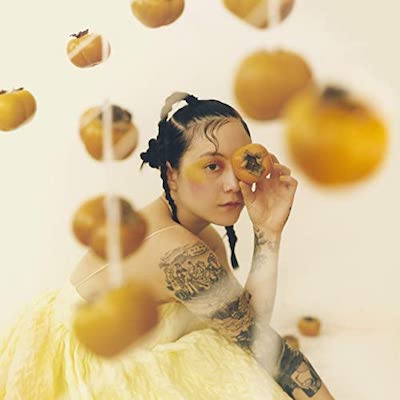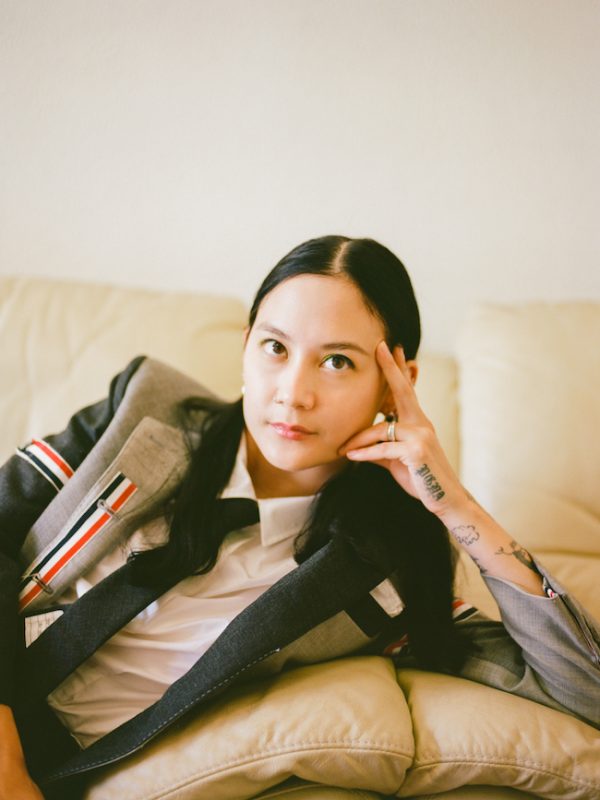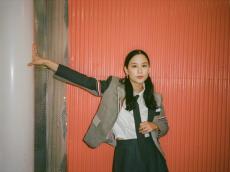Interview with Japanese Breakfast about “JUBILEE”
NeoL / 2022年8月29日 20時0分
今年のグラミー賞で「Best Alternative Music Album」にもノミネートされた最新アルバム『Jubilee』の成功を受け、いまやインディ・ミュージックの枠を超えて注目を浴びる存在となったジャパニーズ・ブレックファストことミシェル・ザウナー。アメリカのバイデン大統領の就任イベントに招かれ披露したパフォーマンスが話題を集めたことも記憶に新しいが、同じくアルバムをリリースした昨年には、自身と母親の関係を綴った回顧録『Crying In H Mart』を出版。映画化されることが決定するなど、彼女を取り巻く状況はここ数年で大きな飛躍を見せている。最近では「アジア系アメリカ人」を代表するひとりとしてクローズアップされることも増えた彼女だが、そうしたさまざまな反響も含めていまの自分が置かれた環境、ジャパニーズ・ブレックファーストというアーティストの現在について、当の本人はどう感じて、何を思っているのか。「この一年は本当に驚きの連続でした」――フジ・ロックに出演した翌日、東京のオフィスで彼女に話を聞いてみた。(→ in English)
――昨日のステージで着ていた、あの犬の顔が縫い付けられたみたいな衣装、話題になっていましたね。
ミシェル「(笑)「Nφ dress」という、ずっと愛用しているお気に入りのブランドの服で。中国人のデザイナーがやっている小さなブランドなんですけど、とても遊び心があって、インパクトがあるし面白いと思ったんです。それに野外のフェスだったら袖がない方が動きやすいなって思って。それで選びました」
――かわいいものとかっこいいもの、ミシェルさんはどっちに惹かれますか。
ミシェル「長い間、ミュージシャンとして、それも“女性ミュージシャン”として真剣に受け止めてもらうためには、もう少し真面目で、男性的な服装をしなければならないと常に言われてきたと思います。でも年齢を重ねて、証明するものが少なくなってくるにつれて、服装もいろいろと試したりだんだんと実験的になってきました。だから(かわいいものもかっこいいものも)どちらも好きなんだと思います。ただ以前は、もう少しクールなものが多かったかもしれないですね」
――経験を重ねていくなかで服装も変化してきた?
ミシェル「そうですね。以前やっていたリトル・ビッグ・リーグというバンドは、どちらかというとエモでパンク寄りのプロジェクトでした。なのでギター・プレイももう少しチャレンジングで、複雑なものが多かった。それに対して、いまの私の音楽のスタイルはもう少しポップでメロディックなものだと思う。そうした変化が服装にも表れているんじゃないかな」
――フジ・ロックでは“Dreams”のカヴァーも披露されていましたね。『恋する惑星』の映像も一緒に流しながら。
ミシェル「10代の頃にクランベリーズをよく聴いていたんです。当時、彼女たちの曲はいろんな映画で流れていました。大学時代にウォン・カーウァイの映画に出会って、深く心を打たれたことを覚えています。ジャパニーズ・ブレックファストのミュージック・ビデオを監督するときは、彼の映画から大きなインスピレーションを得ています。実は、あの映像を使うことは直前になって決まったんです。それで照明デザイナーに相談したら、『もしWi-Fiが十分に強ければ(映像を)ダウンロードできるかもしれない』って言われて。本当に直前の決断だったんですが、結果とてもうまくいってよかったです」
――最高の演出でした。
ミシェル「それと、フェイ・ウォンのスタイルがとても好きなんです。実は、自分の服装を見て彼女のことを思い出したんですね。彼女のコンサートの衣装は有名で、シャワーカーテンのようなドレスを着ていて、それに下着が見えているんです。ああいう衣装はコンサートにぴったりだと思います。パフォーマーであれば、少し奇妙なファッションも表現することができるから。だから彼女のことを思い浮かべたのかもしれませんね」
――去年ニュー・アルバムの『Jubilee』がリリースされて、ちょうど一年が経とうとしています。振り返ってみて、あのアルバムはミシェルさんにとってどんな作品になりましたか。
ミシェル「とても誇りに思っています。それに、心のなかで『これが自分にとって最高の作品になるんだ』とわかっていました。マネージャーやチームと一緒にレコードをリリースしたのは今回が初めてだったので、この結果はとても嬉しいし、リアクションには本当に驚かされました。当初、回顧録(『Crying In H Mart』)とアルバムが同じタイミングで発表されることは意図していなかったんです。でも結果、このふたつの作品は対になっているというか、ある意味ひとつのプロジェクトとして互いに補完し合うような関係になっていると思います。だからそれはとてもユニークなプレス・サイクルだったと思います」
――『Jubilee』は世界中で大きな反響を呼びましたが、ミシェルさんにとっても、今まで見たことのない景色や場所に連れて行ってくれた作品になったのではないでしょうか。
ミシェル「この一年は本当に驚きの連続でした。私はそもそもDIY的なバックグラウンドの出身で、16歳の時から自分でプレスして、自分でブッキングして、ハウス・ショーや小さな会場でライヴをして、ミニバンでツアーして……って、ひとりで全てをやってきたんです。だから自分としては、ゆっくりと徐々に成長してきたという実感があります。なので、まさかツアーバスでツアーをすることになるとは思ってなかったし、グラミーの授賞式に出たり、サタデー・ナイト・ライヴに出演したりするなんて、子供の頃に夢にも思っていなかった。すべてが驚きの連続でしたね」

――リリースしてから時間がたってみて、アルバムについて改めて思うことだったり、新たに気づいたことなどありましたか。
ミシェル「アーティストが自分のことを物語化、寓話化したいというのはごく自然なことだし、よくあることだと思います。ただ自分の場合、この前の2枚のレコード(1st『Psychopomp』、2nd『Soft Sounds from Another Planet』)を書いた後、そうしたテーマについて言うべきことはすべて言い切った気がしたんです。そして、自分について知られていることとは正反対のことを書きたくなりました。アーティストというのは、人を驚かせたい、みんなが期待していることの逆をやりたいと思うものだと思うんです。それに、インディ・アーティストは“悲しみ”をテーマにすることを期待されていることが多いですよね? だからそこからの脱却という思いもあり、“喜び”についてのアルバムを書こうと思ったんです。それはとても重要なことでした」
――回顧録の『Crying In H Mart』を書こうと思ったのは、どういう理由からだったんですか。
ミシェル「そうしなければならないと思ったんです。何が起きているのか理解したかったし、自分が見たこと、経験したことを表現したかった――死にゆく人の世話をしている身の者として。半年間、母の介護をしたことは、とても衝撃的で悲しい経験でした。それと同時に、そのような経験をしたことのない友人や同世代の人たちからの疎外感のようなものもあって。だからそのような時に、そうした経験や感情を自分のアートを通して表現したいと思ったのは、とても自然なことだったと思います。そして、その複雑な心境を表現するにはアルバムでは言葉が足りない、音楽だけでは伝えられることが限られていると思ったんです。そう感じたのは初めてのことでした」
――『Jubilee』を作るため、前に進むために必要なプロセスだったんですね。
ミシェル「私は3人家族の一人っ子で、母とはとても仲が良かったんです。ただ6ヶ月の間、母を看病しているなかで、家庭環境が崩れ去ってしまうような恐怖がありました。すべてがあまりにもあっという間に過ぎてしまったので、自分のなかでうまく処理できなかったんだと思います。その気持ちを理解して咀嚼するためにも、何かプロジェクトが必要だったんです」
―― 一方、『Crying in H Mart』は韓国人としてのルーツ、韓国系アメリカ人としてのアイデンティティについて書かれた一冊でもあります。
ミシェル「アイデンティティやルーツに関してという点では、韓国人とのハーフで、韓国人の親を亡くすという自分が置かれた環境というのは、とても特殊なものだったのだと思います。そうしたなかで、突然自分から親がいなくなったら、韓国人としての自分はどうなってしまうんだろう、という新しい疑問が生まれました。同じような経験をした人の話をこれまで聞いたことがなかったし、それはとてもユニークな強迫観念でした。なので、これは面白いテーマだと思ったんです。そして他の人たちもこのような話を求めているのだと確信しました」
――ただ併せて、ジャパニーズ・ブレックファストというアーティストに対する注目が高まるなかで、こうしたインタヴューなどの場で「アジア系アメリカ人」を代表するひとりとして意見を求められたり、オピニンオンリーダーとして期待される機会が近年とくに増えたかと思います。そうした状況については率直にどう感じていますか。
ミシェル「とてももどかしい思いをしました。もちろん、そうした役割を担えることをとても嬉しく思っている部分もあるのですが。多くのアジア系アメリカ人、とくに若い女の子たちにとって、少なくともアメリカでは白人男性が支配しているインディ・ロックという分野で(自分が)活躍する姿を見ることは、とても勇気付けられることであるというのはわかるんです。なので私自身としては、“白人男性ではない”という存在であることを楽しんでいるところがあります。そして、そのようなプラットフォームにおいて注目されることには責任があることも理解しています。でも、私はとりたてて政治的な意見をもって活動するような人間ではないんです。なので、突然そのようなことを代弁する立場に立たされるのは、とくに“喜び”をテーマにしたアルバムをリリースしたばかりであればこそ、とても困難を伴うものでした」
――ええ。
ミシェル「悲しみや母と娘の関係について書かれたあの本は、私にとって必ずしもアジア系アメリカ人の物語ではありません。『Jubilee』だってアジアン・アメリカンのアルバムではない。ただ、私の個人的な表現なんです。自分のアイデンティティを意識して作っているわけではありません。だから、いわば諸刃の剣のようなものです。ニュースキャスターからそのような質問をされたのは初めてで、驚きました。私は自分のアルバムについて話すつもりなのに、『なぜアジア人に対するヘイトクライムが起きたのか?』と聞かれるなんて。私がやったわけではないのですから。だから、それはとても大きな教訓になりました」

――ある特定のカルチャーやファンダムの代表としてではなく、ひとりのアーティストとして見てもらいたい。
ミシェル「そうですね。つまり、私は自分のプロジェクトを作ることにほとんどの時間を費やしているわけです。だから、他のアイデンティティだったり政治的な問題ではなく、そのプロジェクトについてよく理解しているつもりです。仮にもし白人の男性があるプロジェクトを作ったとして、そのプロジェクトに関する質問しかされないでしょう? 政治的なアイデンティティの問題については何も質問されないんです。なので、そのような負担を負わなければならないことがもどかしい。それに、自分に(政治に関する)知識がないことに怖さを感じるところもあるんです」
――今年の春にルナ・リー(※韓国系カナダ人)が日本で作品をリリースした際に少しだけお手伝いさせてもらったのですが、彼女はあなたからのサポートがキャリアを開くうえで大きなきっかけになったと話しています。
ミシェル「自分がそうした責任の一端を負う立場であることは自覚しています。2016年にこのプロジェクトを始めたとき、初めて5週間の北米ツアーに連れて行ってくれたのがミツキで、全公演がソールドアウトだったんです。それは私にとってキャリアの大きな分岐点でした。私のキャリアが今あるのはいろんな意味でミツキのおかげだし、そのことにとても感謝しています。ミツキはいつも自分のプラットフォームを使って、そういうチャンスに恵まれないアーティスト、とくに女性アーティストやさまざまな人種のアーティストを引き上げようとしていると思うんです。私はそんな彼女を尊敬していますし、私も自分のプラットフォームでそれを実現したいと考えています」
――いま話してくれたツアーにはあなたやミツキの他にジェイ・ソム(※フィリピン系アメリカ人)も参加していて、それこそ白人男性が多くを占めていたアメリカのインディ・ロックの状況に一石を投じる出来事だったと思います。あれから時間がたって、状況に変化を感じるところはありますか?
ミシェル「確かに状況は良くなったと思います。ただ、平等になったとはまだ言えないと思います。というか、ミツキは種を蒔いたんだと思います。そして実際、こんなにも多様性のあるシーンになるとは思ってもみませんでした。そのことに感謝しています。でも、どうなんだろう? 人口の比率から考えて。完全にイコールになることは難しいと思います。それでももちろん、いいところまで来ていると思います」
――『Jubilee』と『Crying in H Mart』は、ジャパニーズ・ブレックファストというアーティストにとって新たな境地、大きな節目を意味する作品になったと思います。そうした経験を踏まえて、これから先の展望について考えていることを教えてください。
ミシェル「これからも挑戦を続けたいと思います。そろそろ新しいアルバムを作りたいと思っているし、2024年にはまた本を書く予定です。それと、韓国に1年間移住したいと考えています」
――理由はなんですか?
ミシェル「韓国語を流暢に話せるようになりたいとずっと思っていたんです。母はよく、半年から1年ぐらい韓国に住めば韓国語を身につけることができるだろうって言ってくれました。基礎はしっかりできているつもりですが、練習が足りないんです(笑)。だから、韓国で1年間生活して、日々言葉を覚えていく過程を記録したら、きっと面白い本になるんじゃないかって。その頃には、ツアーから離れた生活をしたいと思うようになるでしょうね。年齢を重ねるにつれていろいろなことが少しづつ難しくなってくるので、何か挑戦してみたいんです」
――そういえば、『Crying In H Mart』の映画化の話はどこまで進んでいるんですか?
ミシェル「まだ何も。脚本を書いていて、第一稿を書き上げたところです。今スタジオがノートを作っていて、それが完成すればゴーサインが出るでしょうし、そうすればもっと詳細が分かると思います。誰が監督をするのか、キャスティングはどうするのか。でも、まだ本当に初期の段階です」
――去年、ゲーム(『Sable』)のサウンドトラックを制作されましたよね。ゆくゆくは映画のサウンドトラックを手がけたいという考えもあるのではないでしょうか?
ミシェル「映画の音楽を作るかどうかはわかりませんが、『Crying In H Mart』の映画ではサウンドトラックの監修とミュージシャンの選定をしたいと思っています。音楽は私にとってとても大切なものだから。16歳のときに聴いていた曲、好きな韓国のバンドのタイプ、25歳のときに聴いていた曲などを選びたい。それはとても大事なポイントですね」
――いいですね。
ミシェル「自分にとって特別なサウンドトラックが、映画『Garden State(邦題:終わりで始まりの4日間)』のサウンドトラックなんです。10代の頃、『Garden State』のサウンドトラックからいろいろなバンドを見つけ出すのが自分にとってとても大きなことだったんです。自分の映画でもそういうことをやってみたいですね」
――ところで先日、今度出るThe 1975のニュー・アルバムにあなたが参加していることが発表されましたね。どういう経緯だったんですか?
ミシェル「去年、ニューヨークに引っ越してきたときにエレクトリック・レディというレコーディング・スタジオでプロデューサーのジャック・アントノフとセッションをして、そこで彼とちょっとした友達になったんです。それから連絡を取り合うようになって、コーヒーを飲みに誘ってくれたり、彼はとてもフレンドリーな人だからすっかり仲良くなって」
――へえ。
ミシェル「そんな感じの完璧なニューヨーク・ドリームだったんですね(笑)。で、そしたらある日、彼から『The 1975は好き?』ってメールが来て。The 1975は大好きなバンドのひとつだったから、イエスって答えたんです。私は彼らが秘密のコンサートか何かをやっているのかと思っていたのですが、その5分後に彼が『エレクトリック・レディまでどれくらいで来れる?』って聞いてきて。パジャマ姿のままだったので急いでシャワーを浴びて電車でエレクトリック・レディに行ったら、彼らの曲でバック・ヴォーカルを歌ってくれって言われたんです。とてもエキサイティングだったし、とんでもないサプライズでした。たまたまニューヨークに住んでいて、とてもラッキーでしたね」

photography Marisa Suda
text Junnosuke Amai

Japanese Breakfast
“JUBILEE”
(ビッグ・ナッシング/ウルトラ・ヴァイヴ)
■その他:世界同時発売、解説/歌詞/対訳付、ボーナス・トラック「Coffee Hanjan」のダウンロード・カード封入(初回盤のみ)
■収録曲目:
1. Paprika
2. Be Sweet
3. Kokomo, IN
4. Slide Tackle
5. Posing in Bondage
6. Sit
7. Savage Good Boy
8. In Hell
9. Tactics
10. Posing for Cars
※ボーナス・トラック「Coffee Hanjan」のダウンロード・カード封入(初回盤のみ)

――Your performance at Fuji Rock was great. We saw it online on Youtube and we noticed that you were wearing a top with a dog face. What was the concept behind it?
Michelle : The outfit brand is called nodress. I saw it a long time ago but it’s a small Chinese designer. I thought it was so playful, memorable and funny so it was something that I wanted to wear. In outdoor festivals, I like to wear no sleeves as I get to move around. I thought it was funny.
――Michelle, personally are you into kawaii or cooler and chic style?
Michelle :I think for a long time as a musician, woman musician, I always felt that I needed to dress a little more serious or masculine to be taken seriously. But as I get older, I feel like I have less to prove and I have become more experimental with my style. I think I like both. In earlier times it was something a bit cooler.
――In times when you wanted to prove something when you were younger, what was it that you wanted to prove?
Michelle :I used to be in a band called Little Big League and it was a more punk and emo project. It involved a lot of guitar playing and was more challenging and complicated but my style now is a little more pop and melodic.
――Yesterday, you covered Fee Fi Fo by the Cranberries and in the background, you played video clips of Wong Kar Wai. Was that a special song for you?
Michelle :I listened to a lot of the Cranberries when I was a teenager. I feel that song has been in so many movies. When I was in college I was introduced to Wong Kar Wai films and I fell so deeply in love, I was inspired when I directed the Japanese Breakfast music videos. I just love Faye Wong’s style so much. It was a last-minute decision to play the Cranberries song at Fuji rock. So I was telling our lighting designer, who also does projections, why I decided to cover that song and we watched the trailer together and she said if there is strong enough wifi I can put that video on. It was a last-minute video that can be fun and it seemed to go very well.
I think that my outfit reminded me of her because she has a famous concert outfit where she is wearing a shower curtain dress and you can see her underwear. I think that type of outfit is perfect for the concert because you can be a little bit weirder in your fashion expression when you are a performer. I think that’s why it made me think of her.
――Japanese Breakfast music videos are very cinematic and have a strong plot. You collaborated with video game music as well. In the future would you like to work on movie soundtrack music?
Michelle :I’m not sure if I want to score a movie, but for my “Crying in H Mart” adaptation of my book, I would like to supervise the soundtrack and pick the musicians. Of course, music is important to me so I would love to choose what I would listen to at sixteen, the types of Korean bands I enjoy and what I would have listened to at twenty-five. It is important for me that I get to do that.
One special soundtrack is the Garden State soundtrack. When I was a teenager it was such a big deal to find all these different bands from the Garden State Soundtrack. I would like to do something like that for my movie.
――It’s not your latest record, “Jubilee” was released last year in June, and July. Now that it has been a year, looking back how do you feel about this record?
Michelle :I guess I’m just very proud of how far it has come. I think I knew in my heart that this is my best work. It’s the first time that I released a record with a manager and a full team behind it. So it was amazing to see the response. I also really didn’t intend for the book and the album to come out at the same time as closely together, but I think it was a very unique press cycle because these projects were in conversation with each other.
――In addition to this record, several experiences in the past five to six years had lead you to this place. You may have experienced things for the first time in this process. What were the most surprising experiences?
Michelle :This entire year has been such a big surprise. I come from a very DIY background, and since sixteen years old I did my press, and my booking, played house shows for small venues and toured in a minivan. So it was a very slow route for me. I never expected to tour on a tour bus. I never expected to attend the Grammies or play on SNL. I think in my wildest dreams as a child I never had that ambition so it is all extremely surprising for me.
――Your latest album was about the separation from your mother, and the grief of those moments. Whereas Jubilee was focused more on positivity and joy. I felt that Jubilee came out from those previous records. With the release of the Jubilee album, do you feel a change inside, how do you feel about this experience?
Michelle :I think it is a very natural thing for artists to create a type of self-mythology. After writing those two records, especially after my book, I felt that I said everything I needed to say about that subject. I wanted to write about something that was the opposite of what I was known for. I think as an artist we want to surprise people and do the opposite of what everyone expects of us. To write an album about joy as an indie artist who is expected to be sad all the time, was important to me.

――Jubilee was a great opportunity to change how people think of you. What about the response from people around you, such as your close friends? What have they said about you writing this album?
Michelle :I think they liked it. I don’t often have conversations with my friends about my music. I think they are too afraid.
――Why do you think they are afraid to talk about music?
Michelle :Once you make it it's done so you don’t want to accidentally criticise the music. I’m sure they like it, but I don’t talk to them as much about it.
――“Crying in H Mart” was released with Jubilee. In the book, you mentioned your mother, where you were from and your identity. Why have you decided on writing that book on these topics?
Michelle :I just felt like I had to. You know I just wanted to make sense of what happened or to express what I saw and experienced, specifically as a caretaker of someone who is dying. It was such a shocking and sad experience for six months, taking care of my mother. I felt very isolated from my peers who had never experienced something like that. It felt very natural for me to try to express this through my art and for the first time an album didn’t have enough words to express and encompass the full feeling.
――You mentioned that you “had to” express those emotions. Why did you feel like that?
Michelle :In six months, my family fell apart. I was the only child and I only have a family of three. I was very close to my mom and everything happened so fast that I couldn’t process it unless I had some project to help me understand that feeling. In terms of identity, I think it was a very unique circumstance being half Korean and having your Korean parent die. Suddenly there was a new question am I even Korean anymore? She’s gone. That was a very unique threat to me that I never heard anyone talk about before about that same kind of experience. So I thought it was an interesting topic to explore and I was certain that other people were looking for that type of conversation.
――You mentioned that you would ideally be a part of “Crying in H Mart” when it is visualized. Have there been any preparations made for this?
Michelle :Not yet. I’m writing the screenplay and I finished the first draft. Right now the studio is making notes, once I complete those notes it can be green-lit, Then we will find out more about it. Whether who is directing or casting. But it is still in the very initial stages.
――We were thinking maybe we can see it next year or the year after but is it too early to say that?
Michelle :I don’t know. I have never done this before so we will see how long it takes.
ーーBeing a half-Korean musician and released a book and albums, there must be so much attention to you in 2021. When you were interviewed, many people assumed you were a representative of an Asian-American opinion. You must have been asked a lot about Asian hate crimes and asked to provide an opinion. How did you feel about this?
Michelle :It was very frustrating. I am very glad to be in this role. A lot of Asian-American especially young girls are very empowered by seeing someone in places like the US where it is a heavily white male-dominated field. I enjoy just being that. I understand with your platforms there is a responsibility to raise that. But I don’t know if I’m a particularly politically intelligent activist. To suddenly be put in a position to be a spokesperson about that is challenging. Especially if you just released an album that is about joy and a book that is about grief and mothers and daughters.
To me, it’s not necessarily an Asian-American story or an Asian-American album. It just is my expression. I don’t think about my identity making this thing. So it’s almost a double-edged sword. It was surprising to me to have a news anchor asking me that kind of question. I was thinking I was going to be asked about my album and I was being asked why Asian hate crime was happening. I’m not the one that is doing it so. It was a real lesson.

――You didn’t want to be seen as an representative for a culture. You wanted to be seen as an individual artist.
Michelle :Yes. I mean I think that I spend most of my time creating my projects. So I feel very knowledgeable about that project instead of other identities or political issues. If a caucasian man creates a project, he only gets asked questions about his project. He never gets asked questions about political identities. That’s why it is frustrating to have that question in one of them. I feel scared about not being knowledgeable.
――You mentioned that you wanted to be this symbol of empowerment for younger people and pave the way for them to enter the arts. When we interviewed Luna Li, she mentioned that she received big support from you when she was making music and starting her career. How do you feel and what did you do to support her?
Michelle :That’s part of the responsibility I feel having my platform. When I started this project in 2016, Mitsuki was the one who took me on my first five-week North American tour. All of the shows were sold out. It was a huge career break for me. I owe my career in many ways to Mitsuki and I feel very grateful for that. I think Mitsuki is always trying to use her platform to lift artists that don’t have that kind of chance, especially women artists and different races of artists. I admire her for that so I tried to do that with my platform as well.
――Mitsuki and Japanese Breakfast and Jay Som Tour are all doing well in the music scene. In the past five years, they are still doing well but white supremacy is still happening in the indie scene. Do you think that Asian artists are equally seen?
Michelle :I think it is certainly more, I don’t think it is equal. Like Mitsuki has so many fans and I never expected there to be such a variety and I appreciate it. I think it will be impossible to be equal in a way because it’s not reflective of the population.
――Have the response you’ve been receiving give you a sense that it is getting better?
Michelle :Yes, definitely.
――With the Jubille album and the book, you have challenged yourself. From now on what would you like to sing or express? Seeing the responses from people what would be your next step?
Michelle :I think I will continue and try to do the same thing. I want to write another album soon and will write another book in 2024. I also want to move to Korea for one year.
――So you would like to live in Korea for a year, is this for your music?
Michelle :I think I always felt like I wanted to become fluent in Korean. My mother used to tell me if I lived in Korea for six months to a year, I can learn the language. I have a strong base but never enough practice. So I think it would be an interesting book to document the experience of living in Korea for one year and learning the language day by day. Sort of interesting observations. I think by then I would want a break from touring. As I get older it becomes a little more challenging and I want to try something.
――How did your joint project with 1975 came about?
Michelle :I became causal friends with Jack Antonoff, last year through this recording studio called Electric Lady. I did a session there when I moved to New York. We became in touch and he’s a very friendly guy. He invited me to just have coffee one day and we got along together. So it was such a perfect New York dream. He texted me and asked me one day if I liked 1975, and 1975 was one of my favourite bands. So I said yes. I thought they were having a secret concert or something but five minutes later he asked me how fast I can be at Electric Lady. I was in my pyjamas and I took a shower and took a train to Electric Lady and they asked me to sing background vocals on one of their songs. It was so exciting and a crazy surprise. I was so lucky to happen to live in New York.

photography Marisa Suda
text Junnosuke Amai
関連記事のまとめはこちら
https://www.neol.jp/music-2/
外部リンク
- Interview with Japanese Breakfast about “JUBILEE”
- björkがニュー・アルバム『fossora(フォソーラ)』をアナウンス。アルバムからのシングル「atopos(アトポス)」を近日リリース。来日公演も決定
- アークティック・モンキーズ 待望のニュー・アルバム『THE CAR』の リリースを発表
- 「僕らは音楽におけるインディーズ映画なんだと思う。誰かに付き合ってもらって、ジョエルとイーサン・コーエンの映画のようなことをするんだ」ロイクソップ 『Profound Mysteries』 インタビュー/Interview with Röyksopp about “Profound Mysteries”
- ジャンルを往来するサウンドと真摯なリリックで、ケンドリック・ラマーをはじめゴリラズ、アンダーソン・パック、アブ・ソウル、ローリン・ヒルら錚々たるアーティストたちを魅了するアーティスト、リトル・シムズの単独公演が決定
この記事に関連するニュース
-
英語で「それは大変だったね」はなんて言う?
OTONA SALONE / 2025年1月9日 7時0分
-
スリーシェイク所属の早川大貴がクラウドネイティブ技術を推進するCNCF Ambassadorsに就任
PR TIMES / 2024年12月23日 10時45分
-
Shareholder Proposals to Japan Business Systems, Inc.
PR TIMES / 2024年12月22日 14時40分
-
この英語ってどんな意味?「apple of my eye」
OTONA SALONE / 2024年12月22日 7時0分
-
【愛しとーと】国際機関ESQRの品質優秀ダイヤモンド賞「Quality Choice Prize 2024」を受賞!
PR TIMES / 2024年12月20日 13時45分
ランキング
-
140歳から運動不足解消は何から始めたら良いの?
JIJICO / 2018年3月30日 7時30分
-
2年末年始に困った「女性の不調」、1位は?
マイナビニュース / 2025年1月10日 19時3分
-
3俺はまだまだ現役だ!年金月26万円・65歳の元営業本部長、ノリノリで再就職したが…日本年金機構から送られてきた〈年金カットの通知〉に怒り「あまりにひどい」
THE GOLD ONLINE(ゴールドオンライン) / 2025年1月10日 7時45分
-
4精神疲労で固まりがちな身体をケアする方法 胸椎や胸骨を柔らかく保つと自律神経が整う
東洋経済オンライン / 2025年1月10日 7時10分
-
5「30年物の和式トイレ」も改修できず…350万円を市民から集めた地方大学の雄に「どれだけお金ないのよ」の声
プレジデントオンライン / 2025年1月9日 16時15分
記事ミッション中・・・
記事にリアクションする
![]()
記事ミッション中・・・
記事にリアクションする

エラーが発生しました
ページを再読み込みして
ください










